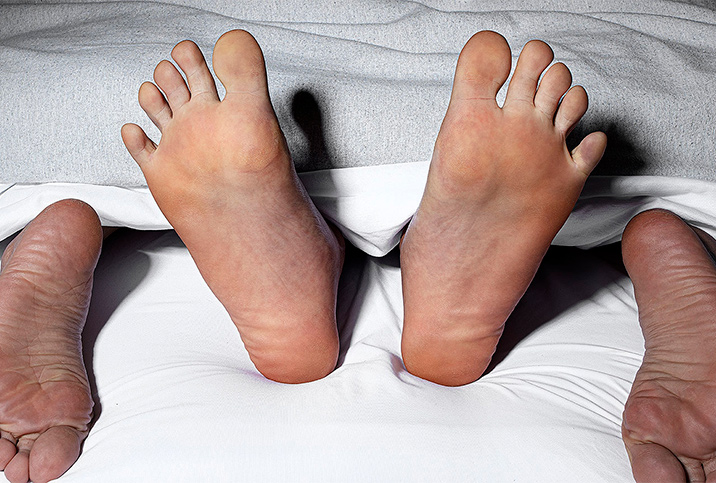Science of the Male Orgasm and Ejaculation

Every man with a pulse likely knows orgasms are a crucial facet to an all-around healthy life, in and outside the bedroom.
But what exactly happens to the male body just before ejaculation?
An orgasm involves a series of muscle contractions in the genital area that is accompanied by a sudden release of endorphins. For men, orgasm typically but not always accompanies ejaculation as a result of sexual stimulation.
The fuel that leads to orgasm is the sex hormone testosterone, which is produced in the testicles. The testicles make millions of sperm every day, which are mixed with whitish, protein-rich fluids. This mixture of fluid and sperm, known as semen, is passed through the urethra and out of the penis during orgasm.
Stages of orgasm
During an orgasm, men feel a pleasurable pulsating sensation in their penis, prostate and pelvic region. Increased heart rate and rapid breathing also accompany an orgasm, as well as an increase in blood pressure and contractions of the sphincter and the muscles at the base of the penis. These heightened responses are followed by a sudden release of pressure and a feeling of relaxation. When broken down, the process of orgasm has four stages: excitement, plateau, climax and resolution.
Excitement
During the initial excitement stage, a man will begin to have a flushed feeling, warm body temperature and quicker heart rate. The increased blood pressure and heart rate cause the brain to produce an influx of serotonin and dopamine—chemicals that cause feelings of pleasure.
The brain sends a signal down the spine and to the penis, and this signal triggers increased blood flow to the shaft, causing an erection. Veins in the penis that typically circulate blood in and out of the organ clamp themselves shut, keeping blood in the penis and allowing an erection to be maintained.
Plateau
The plateau stage happens right before orgasm and generally lasts for a short period. As sexual tension builds, blood flow is increased, muscles tense or spasm and the penis and testicles retract into the scrotum as they prepare to release semen. Pre-ejaculatory fluid, also known as pre-cum, may release from the urethra. This fluid alters the pH level in the urethra to ensure the sperm will be able to survive when leaving the body.
Climax and ejaculation
When a man reaches the climax phase of orgasm, semen moves to the top of the urethra and is released through contractions of the muscles in the penis, as well as muscles in the pelvis.
Ejaculation is followed by a pleasurable sensation of released sexual tension. When orgasm begins, a man’s respiratory and heart rate are at their highest levels. Many men also sweat a lot during orgasm as their internal body temperature rises.
Resolution
After the orgasm, the penis begins to soften, and the scrotum is no longer retracted. Heart rate and blood pressure return to normal, and a feeling of relaxation emerges. Most men cannot have another orgasm until they have recovered. This is known as the “refractory” period, and it varies among men depending upon age, health and other factors. Younger men may take as little as 15 to 30 minutes, whereas older men may take 24 hours.
Health benefits of orgasms
Though pleasure alone is probably reason enough to desire frequent orgasms, studies report a host of health benefits as well.
Reduced risk of prostate cancer
Some research indicates that regular ejaculation may reduce your risk of developing prostate cancer. A study from the National Cancer Institute compared about 30,000 men and found that those who had more than 21 orgasms every month were 30 percent less likely to develop prostate cancer than those who had less than seven. Another study in BJU International found that men who averaged five or more orgasms per week in their twenties had a one-third lower incidence of prostate cancer later in life.
Improved heart health
Physical health and sexual health go hand in hand. Researchers believe that men who are in better health overall have stronger sex drives, which leads them to have more sex and improves their cardiovascular systems. According to a study published in The American Journal of Cardiology, men who orgasm once a month or less were 45 percent more likely to have a stroke or cardiovascular disease than those who did so more than twice a week.
Better sleep
When you experience an orgasm, a surge of endorphins, oxytocin, and prolactin occur. These hormones have a sedative effect on the body, which can help you sleep.
Longer life
Having orgasms can potentially extend your life. A study published in The BMJ looked at 918 men between the ages of 45 and 59 over four years. The researchers found that the men with “high orgasmic frequency” reduced their mortality risk by up to 50 percent. The subjects who had two or more orgasms each week died at half the rate of the men who had orgasms less than once a month.
Stress relief
Orgasms can take your mind off stressful situations and can also be indicative of a happy, healthy sexual relationship. The oxytocin and endorphins released by orgasm can make people feel more relaxed and comfortable. Ejaculation doesn't have to happen with a partner to have stress-relief benefits. Studies have indicated that both partnered sex and masturbation can lower stress levels.
Reduced depression
The surge of dopamine produced by an orgasm has been linked to feelings of happiness and satisfaction, which could improve depression.
Male orgasmic disorders
Male orgasmic disorder, also referred to as anorgasmia, is the inability to reach orgasm after plenty of sexual stimulation, also often referred to as delayed ejaculation. These conditions should not be confused with erectile dysfunction or low libido, although they might coexist. Premature ejaculation is essentially the opposite of delayed ejaculation—having an orgasm before sex or within a minute of starting. And retrograde ejaculation, sometimes referred to as “dry orgasm,” is when a man reaches sexual climax but does not release semen. Semen enters the bladder instead of coming out of the penis.
Talk with your doctor if you are exhibiting symptoms of any of these orgasmic disorders as they are all common and nothing to be ashamed of. With proper treatment, many men see their condition improve and go on to enjoy happy and fulfilling sex lives.
Tips for better orgasms
Whether sex is challenging or effortless for you, there’s always room for improvement and increased pleasure. Next time you’re ready for some inspiration, give these orgasmic tips a try.
Stimulate the prostate
The prostate is a walnut-sized gland located below the rectum, toward the scrotum. To stimulate the prostate, insert a finger into the anus. The prostate can provide great amounts of pleasure and can increase the intensity of orgasms when it’s stimulated while you come.
Remember to breathe
Many people tend to hold their breath during orgasm. But if you can learn how to control your breath and focus on it, you will experience more intense and pleasurable orgasms. Right when you feel yourself climaxing, inhale deeply for four seconds, then exhale slowly out the mouth for four seconds. This will help expand the feelings of orgasm and circulate that feeling throughout the body.
Cut back on alcohol
“Whiskey dick,” or the inability to maintain an erection after having alcoholic drinks, is a real phenomenon. Alcohol is a depressant, and it can affect parts of the nervous system that are key to having an orgasm.
Eat an orgasm-friendly diet
Spinach helps dilate blood vessels, which can increase blood flow to the genitals. Kale and cabbage are great sources of folate, which helps reproductive health. Eggs are rich in B vitamins, which ease stress and are important for a healthy libido and can lead to better orgasms. Oats and whole grains can increase testosterone in your bloodstream. More testosterone leads to more intense orgasms.
Try edging
Edging is the act of bringing yourself to the brink of orgasm and then backing off and repeating it again and again. By staying in this heightened state of arousal, you can build the intensity of the orgasm when you let yourself go over the edge. The longer you delay the orgasm, the more intense it will be.
Perhaps the best tip for a lifetime of good orgasms is simply to slow down and keep it simple—lead a healthy life, practice safe sex to avoid worries, take time to relax and get to know your wants and needs, communicate well with your sexual partners and always be on the lookout for exciting new positions and activities to try in bed.


















